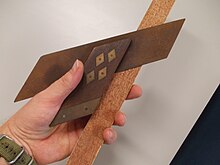A miter square or mitre square is a hand tool used in woodworking and metalworking for marking and checking angles other than 90°. Most miter squares are for marking and checking 45° angles and its supplementary angle, 135°.[1][2]
 A mitre square with a wooden stock, a steel blade, and brass rivets | |
| Other names | Mitre square |
|---|---|
| Classification | |
| Used with | Pens, pencils, marking knives |
| Related | Square (tool) |
A miter is a bevelled edge – usually 45° – used, for example, for making miter joints for woodworking.[2] Squares are tools designed for marking and checking specific fixed angles, usually 90° or 45°, though most squares are exclusively for working with 90° angles.
Description
editAs with 90° squares, there are many different types of miter square. Miter squares are usually made from two fixed parts, a stock and a blade (sometimes called a tongue).
The blade on a modern factory-made miter square is typically a thin piece of metal which is fixed at 45° onto or into the stock, forming a 'T' shape. The stock is usually much thicker than the blade and is made from wood, metal or plastic. Until the development of factory-made squares in the 18th century miter squares were made entirely from wood, though some woodworkers still make themselves wooden miter squares.[1]
Other forms of miter square include the dovetail square, with the blade set at an angle suited to marking out dovetail joints, and the Japanese miter square, a flat piece of metal with a thin metal stock along one edge – similar in construction to a speed square.[3]
Some other types of square incorporate miter squares, such as combination squares, speed squares, and try squares with a mitered stock.[4][1]
Examples
edit-
Square with a wooden stock, a steel blade, and brass rivets
-
A metal miter square
-
A try square with a miterd stock
-
Combination squares incorporate a miter square
-
A square similar in design to historic wooden try squares
-
Square made from beech
-
A mitered T-square
-
A miter bevel[5]
References
edit- ^ a b c Salaman, R. A. (1975). Dictionary of tools used in the woodworking and allied trades, c. 1700-1970. New York, USA: Scribner. pp. 472–479. ISBN 978-0-684-14535-8 – via Internet Archive.
- ^ a b "mitre square | miter square, n.". Oxford English Dictionary. Oxford University Press. July 2023. doi:10.1093/OED/4371811980.
- ^ Truini, Joseph (September 1986). "Measuring Up". Popular Mechanics. Hearst Magazines. pp. 87–90. ISSN 0032-4558. Archived from the original on 10 July 2022. Retrieved 29 October 2020.
- ^ "The Multi-talented Combination Square: A Whole Lot Of Tool In One Small Package". www.woodcraft.com. Archived from the original on 31 October 2020. Retrieved 27 October 2020.
- ^ Schwarz, Christopher (27 May 2014). "Melencolia Square, Part 2: An Angular English Friend". Lost Art Press. Archived from the original on 27 October 2020. Retrieved 27 October 2020.